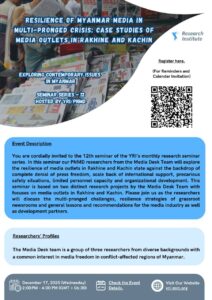Abstract
This study investigates how rural communities in Myanmar perceive and engage with procedural environmental rights—specifically, the rights to access information and participate in environmental decision-making. Focusing on villages around Indawgyi Lake, an ecologically significant area in Kachin State, the study draws on household surveys (n=58) and key informant interviews (n=27) to assess environmental awareness, information access, and participation levels. Findings reveal high concern for environmental degradation, including climate impacts, mining pollution, and biodiversity loss, but limited understanding of environmental rights and formal regulations. While most respondents accessed information through digital media or civil society organizations, barriers such as language, weak infrastructure, and limited outreach persist. Participation in decision-making processes was minimal, despite strong willingness among community members. The study highlights the need for inclusive environmental governance models that combine legal provisions with institutional accountability, localized communication strategies, and support for community-based organizations. Policy recommendations include strengthening environmental education, expanding access to information, institutionalizing participatory frameworks, and harmonizing legal mandates. These findings contribute to regional and global discussions on environmental rights in politically and institutionally fragile contexts.

